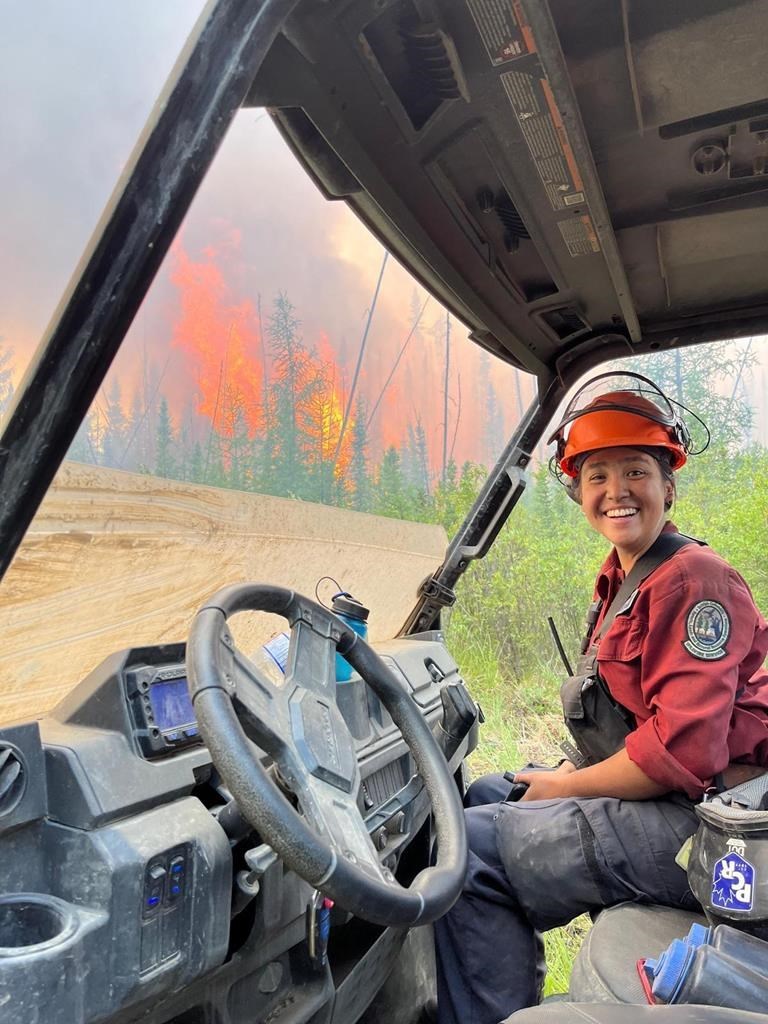The British Columbia Wildfire Service is paying tribute to the 19-year-old firefighter who died after being struck by a falling tree last week, calling her "the heart of us."
The service is also sharing a statement from Devyn Gale's family, who say they are grateful to have grown up alongside such an "amazing sister and loving daughter."
The family says Gale was careful, considerate and hardworking, and everything she did was out of kindness.
Gale's death on Thursday came amid an eruption of wildfire activity that has prompted military support to be sent to B.C. as the province battles hundreds of fires, many caused by lightning in recent days.
The Ministry of Emergency Management says two Canadian Armed Forces reconnaissance teams were being deployed Sunday, including a "land force team" headed for Prince George and an air force team bound for Kamloops.
Gale died Thursday as her crew battled an out-of-control wildfire near Revelstoke.
The wildfire service says in its statement on Twitter that Gale was an "initial attack crew member" operating out of the Columbia Fire Zone in Revelstoke.
"She was a trusted colleague, a loving friend, a beloved sibling and a cherished daughter," the statement says.
"She personified the iconic Reds and Blues (uniform) of wildland firefighting in British Columbia: she was bravery, grit, hard work, determination, leadership and selflessness. She was one of us. She was the heart of us."
The statement says it is "hard to articulate the connectedness" of the firefighting community that had "lost one of our own."
Meanwhile, as military troops and other reinforcements fanned out across the province to combat hundreds of active wildfires, the emergency management ministry said armed forces teams will conduct assessments that will inform deployment plans for additional federal resources.
It said a working group consisting of members of Public Safety Canada, the military and B.C. emergency management and wildfire officials are also set to meet Monday.
With around 380 wildfires burning in B.C., the Canadian Interagency Forest Fire Centre says the province has the greatest number of blazes across the country.
The number of highly visible, threatening or potentially damaging blazes has ticked up to 23, and there were more than 70 wildfire-related evacuation alerts or orders on Sunday, with many clustered in several regions of B.C.'s central Interior.
The Cariboo Regional District issued an order this weekend covering 38 parcels of land in a 160-square-kilometre area around Anahim Peak, northeast of Bella Coola.
That's on top of an order issued Friday spanning nearly 3,340 square kilometres in the Lhoosk'uz area, west of Quesnel, and several others in the area.
The Regional District of Bulkley-Nechako, meanwhile, rescinded an evacuation order in response to the Big Creek wildfire on Sunday. Residents of a remote area that includes Omineca Provincial Park may return home after more than two weeks away, although they remain subject to an alert and must be ready to leave immediately.
The Peace River Regional District also cancelled an evacuation alert covering 60 properties due to the Donnie Creek blaze, the largest in B.C.'s history.
The alert had spanned a lengthy stretch of Highway 97, along with properties in a remote area north of Fort St. John, for more than two weeks.
Environment Canada continued to warn of smoky skies and reduced visibility throughout central and eastern B.C. on Sunday, while maintaining severe thunderstorm bulletins for a swath of the central Interior throughout the day.
B.C.'s Transportation Ministry has warned drivers not to pull over and stop to take pictures of wildfires, saying it's "very unsafe" to do so.
A statement posted to Facebook said ministry staff have heard reports of people stopping along highways, especially Highway 16 between Prince Rupert and Prince George, a route where several "wildfires of note" are burning nearby.
Canada's record-breaking wildfire season has now seen 100,000 square kilometres of land scorched, an area equal to roughly the size of Lake Ontario, Lake Erie and Lake Michigan combined.
Fueling the fire, the Canadian Drought Monitor shows vast areas are considered "abnormally dry," with several pockets of "extreme drought" in B.C. and Alberta.
B.C.'s drought bulletin shows more than half of the province is classified at drought Level 4 of five or higher, meaning harm to ecosystems and communities is likely.
Four of the 34 basins the province monitors are ranked at the most severe level of drought, meaning adverse impacts are almost certain. That includes all of Vancouver Island, the Bulkley-Lakes basin and the Fort Nelson basin.
This report by The Canadian Press was first published July 16, 2023.
Brenna Owen, The Canadian Press



